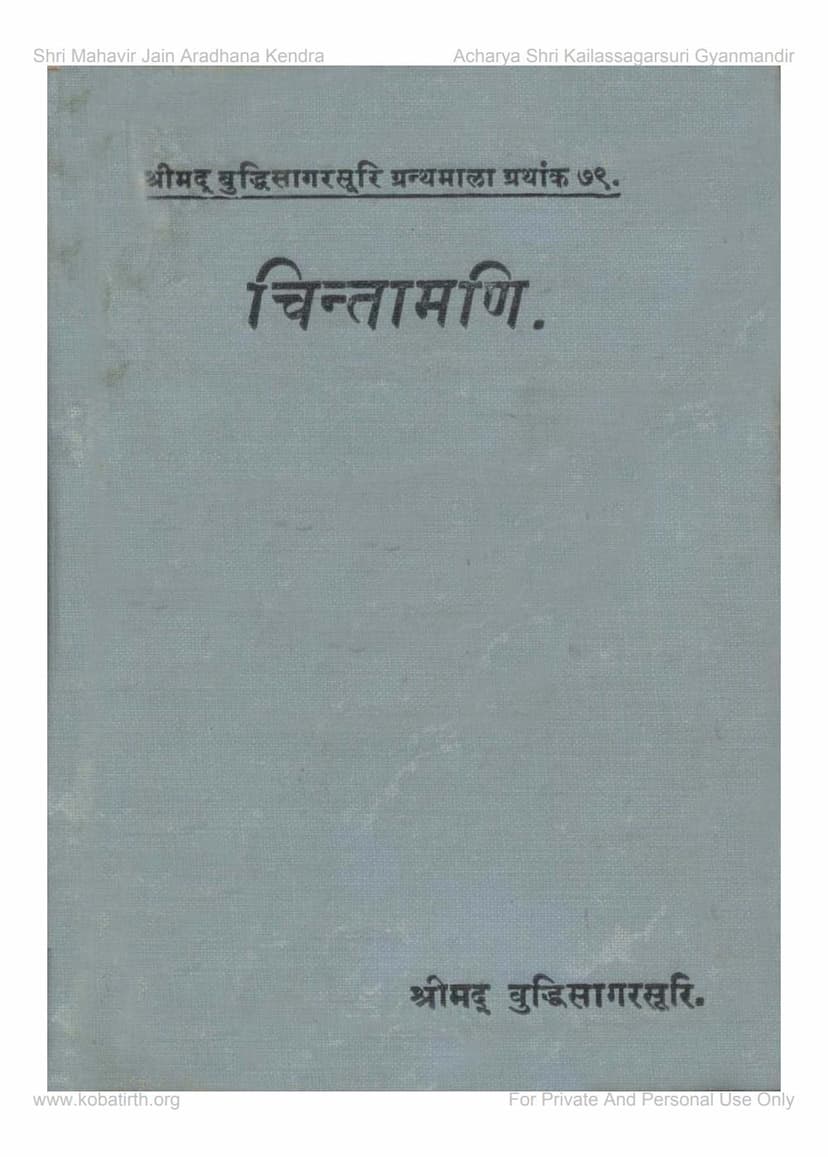Chintamani
Added to library: September 1, 2025

Summary
Here's a comprehensive summary of the Jain text "Chintamani" by Buddhisagar, based on the provided pages:
Book Title: Chintamani (चिन्तामणि) Author: Acharya Shrimad Buddhisagar Suriji (शास्त्रविशारद योगनिष्ठ जैनाचार्य श्रीमद् बुद्धिसागरसूरिजी) Publisher: Jainoday Buddhisagar Samaj, Sanand (through Shri Adhyatma Gyan Prasarak Mandal)
Overall Purpose and Theme:
"Chintamani" is a religious and ethical guide primarily aimed at Jain children and young individuals, offering valuable teachings and moral principles to foster spiritual development and adherence to Jain dharma. It emphasizes the importance of virtuous conduct, spiritual knowledge, and righteous living for achieving salvation (Moksha). The book is structured to impart wisdom that leads to self-improvement and the ultimate goal of spiritual upliftment.
Key Content and Messages:
-
Dedication and Purpose: The book is dedicated to specific individuals who have contributed to Jain religious activities, highlighting the interconnectedness of spiritual endeavors. It aims to guide young Jain minds towards a life of righteousness and spiritual pursuit.
-
Jain Dharma Principles: The text reiterates the fundamental tenets of Jainism, emphasizing its eternal and indestructible nature. It speaks of the Tirthankaras and the lineage of spiritual leaders, underscoring the importance of following the teachings of Mahavir Swami.
-
Paths to Liberation: The book differentiates between the spiritual paths for monks (Sadhu Dharma) and lay followers (Shravak Dharma). It explains that while the monastic path leads to quicker liberation, the path of a devout layperson also leads to spiritual progress and eventual salvation.
-
Ethical Guidelines and Conduct: A significant portion of the book is dedicated to providing detailed ethical guidelines for Jain children and individuals. These guidelines cover various aspects of life, including:
- Upbringing and Education: Parents are urged to guide their children towards dharma from a young age, imparting religious knowledge alongside secular education (including English). The importance of studying Jain scriptures and languages like Prakrit is stressed.
- Personal Conduct: Numerous injunctions are given regarding daily conduct, such as waking early, performing daily prayers (Namokar, Deva Puja), respecting elders and teachers, truthfulness, honesty, refraining from theft, avoiding bad company, and maintaining cleanliness.
- Behavior in Education: Students are advised to study diligently, show respect to their teachers, and avoid idle chatter or creating disturbances in school.
- Social and Moral Virtues: The text champions virtues like honesty, integrity, contentment, forgiveness, humility, compassion, and the avoidance of vices like gambling, drinking, and harmful indulgences.
- Family Values: Emphasis is placed on respecting and obeying parents, fostering harmonious relationships within the family, and avoiding disrespectful behavior towards elders.
- Financial Prudence: Advice is given on managing finances responsibly, avoiding wasteful spending, and not engaging in unethical business practices.
- Religious Observances: The importance of performing religious duties, such as visiting temples, listening to discourses, performing rituals like Samayika and Pratikraman, and observing festivals is highlighted.
- Pilgrimage: Visiting Jain pilgrimage sites is encouraged as a means of spiritual merit.
-
The Nature of Wealth and Knowledge: The book contrasts material wealth with spiritual knowledge, asserting that true wealth lies in knowledge and righteousness, which are eternal, while material possessions are transient.
-
Friendship and Relationships: The text offers guidance on choosing good friends, emphasizing the qualities of a true friend and the dangers of associating with negative influences.
-
The Role of Parents: It underscores the significant responsibility of parents in shaping their children's character and spiritual foundation, warning that neglecting this duty can lead to the child's downfall and the parents' regret.
-
Critique of Modern Trends: The book subtly critiques certain modern trends, like the overemphasis on English education without corresponding religious grounding, suggesting this can lead to a loss of faith and adherence to Jain principles.
-
The "Chintamani" Metaphor: While not explicitly defined in detail in these pages, the title "Chintamani" (wish-fulfilling jewel) suggests the book's content is considered precious and capable of fulfilling the spiritual desires of its readers if followed diligently.
-
Biographical Anecdotes: The text includes biographical sketches of individuals like Seth Fakhirchand Jhanalal and Vakkil Mohanlal Himchand, who were instrumental in supporting Jain religious activities and the publication of such books. These anecdotes serve as inspiring examples of devotion and contribution to the Jain community.
-
Catalog of Published Works: Several pages list numerous other books published by the same organization. This indicates a prolific effort to disseminate Jain literature and knowledge across a wide range of topics within Jainism.
In essence, "Chintamani" is a comprehensive manual for shaping the character and spiritual life of young Jains. It serves as a guide for leading a virtuous life in accordance with Jain teachings, with the ultimate aim of achieving spiritual liberation. The book's detailed instructions cover a broad spectrum of daily living, reinforcing the Jain emphasis on ethical conduct, spiritual discipline, and devotion.